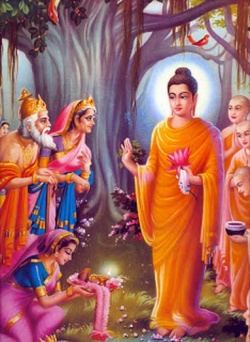Ajjuna
1. Ajjuna-Thera. Son of a councillor of Sāvatthi. In his youth he first joined the Order of the Niganthas; being dissatisfied, he was won over by the Buddha's Twin-miracle and, entering the Order, reached arahantship (Thag.v.88; ThagA.i.186). He is evidently to be identified with Sālapupphadāyaka Thera of the Apadāna (i.169).
In Vipassī Buddha's time he was born as a lion and gave the Buddha a flowering branch of a sala-tree.
He was also once a cakkavattī, named Verocana.
2. Ajjuna. A Pacceka Buddha, who lived ninety-one kappas ago. Panasaphaladāyaka Thera (q.v.) gave him a ripe jackfruit. Ap.i.297.
3. Ajjuna. A Pacceka Buddha who lived ninety-four kappas ago. Ajelaphaladāyaka Thera gave him an of ajela-fruit. Ap.ii.446.
4. Ajjuna. The seventh son of Devagabbhā and Upasāgara ; one of the Andhakavenhuputtā. J. iv.81; Pv.93.
5. Ajjuna. King of the Kekakā, and a great archer. He annoyed the sage Gotama and was destroyed in spite of his bulk and his thousand arms (J.v.267). In the Sarabhanga Jātaka he is mentioned as having sinned against Angīrasa (J.v.135; also DA.i.266). He is identified with Arjuna, called Kārtavīraya of the Kathāsaritsāgara (ii.639), and in the Uttarakanda of the Rāmāyana (Sarga 32).
He used to offer sacrifices to the gods (J.vi.201).
6. Ajjuna. The eldest of the five sons of King Pandu, all of whom were married to Kanhā. On discovering her liaison with a hunchbacked slave and her treachery towards themselves, they gave her up and retired to Himavā (J.v.425f).
Ajjuna was previous birth of the bird-king Kunāla (J.v.427).
